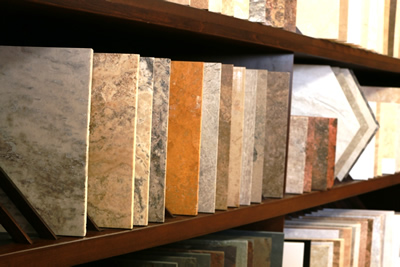Technical Data
Choose a category below to learn more:
Types of Tiles
There are several different types of tiles. Each has it's own characteristics, advantages, benefits, etc. Below is the common classification for tile types;
- Ceramic
- Porcelain
- Glass
- Metal
- Quarry
- Mosaic
- Natural Stone
- Marble
- Limestone
- Granite
- Travertine
- Slate

A large selection of tiles awaits you at Murray's Tile & Marble Co.
General Care & Maintenance
- Don't use bleach or any acidic solutions to your tile: they cause more harm than good.
- Don't use scouring pads or steel wool on your tile, ever. Unless you want scratches.
- Every tile and grout needs to be cleaned with a neutral ph cleaner, no cleaners that are high or low ph they will cause damage.
Specific Care & Maintenance
Each type of tile is a bit different, so here are few tips about maintaining your specific kind of tile:
Routine Grout Cleaning:
Every now and again the grout between your tiles will become stained with a build-up of oils, mildew, or algae. To clean this up simply buy a tile-and-grout cleaner which is usually available in our showroom in stock. Always follow the merchandise instructions for proper application.
Ceramic Tile:
Ceramic tile requires practically no maintenance at all, just warm water with a neutral ph cleaner and mopping. Then let it dry itself to increase the shine.
Metal Tile:
Don't use any scouring pads that may scratch the finish. Once again, simply use warm water to clean. Like any tile, you never want to use acidic products that may harm the surface and discolor the grout.
Glass Tile:
Use a soft towel or cloth to wipe the tile. You may want to use a non-abrasive neutral ph cleaner as well.
Stone Tile:
Stone tile requires different cleaners than ceramic tiles in order to avoid scratching or dulling. Since stone tile can scratch easily, vacuum and mop often. For deeper cleaning, you never want to use solutions that could etch the stone. Instead there are many different levels of specialty stone cleaner that can be purchased through our showroom, pending your situation.
Tile Variations
V1 - Uniform appearance
V2 - Slight Variation
V3 - Moderate Variation
V4 - Substantial variation
Performance Ratings
PEI ratings
PEI rates abrasive resistance of the tile's glaze on a scale of 0-5. This test is only for glazed tiles and does not apply to unglazed porcelain tile or other unglazed types of tile. Deep abrasion test for through body porcelain tile. PEI ratings of glazed tile
Class 0. Suitable for walls only
Class 1. Recommended for wall use, but may be used both on interior walls or bath floors without direct access to outdoor elements.
Class 2. Suitable for most residential floors. May be used where abrasive foot traffic is minimal - such as bathrooms, bedrooms, dining rooms, living rooms, and sun rooms.
Class 3. Ideal for all residential floors. For floors subject to normal foot traffic and usage (including kitchens, outdoor entry ways and hallways).
Class 4. Great for all residential and light-medium commercial. Suitable for light to medium commercial applications. Will withstand moderate foot traffic in many commercial areas (commercial kitchens, hotel rooms, exhibition halls, etc).
Class 5. Great for all residential and most commercial. Ideally suited for all residential and most commercial applications under normal foot traffic conditions (shopping centers, hotel foyers, walkways, and industrial applications). For very high traffic areas, consider and unglazed through-body color porcelain, which does not carry a PEI
Mohs scale
Frederick Mohs invented this geological scale of minerals to rate scratch resistance from 1-10. Think of Mohs as Method Of Hardness Scale. This test is not an industry standard but it's a great comparison to show the difference in scratch resistance between tile and other hard flooring materials.
Coefficient of friction (COF)
The coefficient of friction rates the slip resistance of a tile. ADA recommends a test rating of .6 (wet or dry) on floors and .8 for ramps. However, common sense must prevail. If you are told that a shiny surface tile has a .6 rating, stop and think if that tile really will be slip resistant.
Breaking strength
The breaking strength test is a good indicator of the chip resistance of a tile because it tests the strength and density of the bisque. Using applicable ASTM test, ceramic floor tile typically has a breaking strength of 250 lbs. This can be less for poor quality tiles, higher with porcelain tiles (up to 400lbs)
